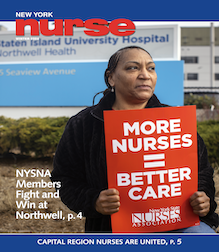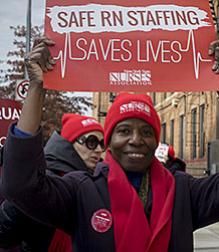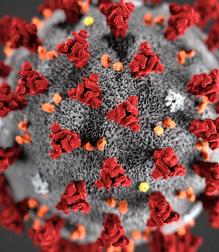
Nurses are traumatized. Whether we live in a region decimated by COVID-19, or live in fear of its deadly visit to our neighborhoods, we know that the organizations designed to protect us — government, regulatory agencies, and hospitals — failed miserably at this task and, inexplicably, seem not to have learned from their mistakes.
Extraordinary economic hardships, due to the job losses that accompanied the social protections essential to prevent the spread of the virus, have further traumatized our communities. Many families live in terror of eviction, foreclosure and starvation. Additionally, alcohol and substance use, chronic pain symptomatology, domestic violence, depression, suicide, and loneliness have all increased exponentially.
Statistics indicate that communities of color overwhelmingly compose those hardest hit by these two crises—data not so shocking to many. This is the backdrop in which we viewed recorded incidents of violence against African Americans, sometimes committed by rogue police or self-described vigilantes. George Floyd’s killing was a reminder of the virulent racism on the streets of our cities more than a half century since the passage of the Civil Rights Act.
Trauma (as defined) can overwhelm an individual’s ability to cope, cause feelings of helplessness, and can diminish the ability to feel the full range of emotions. As a result of such trauma, varying forms of PTSD are prevalent, not only in the caregiver community, but in communities historically at a disadvantage in pursuing “the American Dream.”
And when such trauma is identified, examined and analyzed; when exists the will and energy to address the root causes, to right the wrongs that precipitated the trauma, to engage in the painful process of healing, and correcting, and moving forward — the world can be turned on its head.
And so the floodgates are opened and we all are forced to stop; to see things either through a different lens or to recognize the possibilities of finally addressing the social wrongs that have haunted us, as a nation, for centuries.
Likewise, it provides health care workers with an opportunity to challenge the status quo; to refuse to accept management’s dictates, incompetence, posturing, lack of transparency and casual disregard for our protection that dominated the health care landscape in the age of COVID-19.
Nurses are the first to tell the public that no one can else can comprehend the enormity of what caregivers were subjected to over the past few months. And we are also very clear that we cannot survive, will not accept, a repeat of the nightmares that dominated our lives: the fear of dying, the terror of harming our own families, the anxieties related to working without training and tools, knowing that human lives were in our hands.
Or the COVID-related symptoms we ourselves suffered, the loss of colleagues, relatives and neighbors, the isolation, the sheer exhaustion, the anger and the guilt, the frustration and the hopelessness. No, we cannot possibly endure a repeat of this.
And yet, it appears that hospitals have learned little. They continue to move forward, ignoring our input and concerns. In their rush to move on to elective surgeries and cost-generating procedures, they seek waivers from state guidelines, are again scrimping on PPE, have reduced rather than enhanced staffing, and refuse to collaborate around our educational needs. Instead, they choose to force staff to engage in abbreviated modules that serve to cover their minimal liability concerns but do little to support practitioners’ learning needs, confidence and competencies.
In fact, they are using the pandemic as an excuse to implement destructive programs that were on the books prior to the advent of Corona. They’re closing beds and services that don’t generate profits, such as psychiatry and pediatrics — without a guarantee to bring these services back. They’re moving ahead with plans to close hospitals and entire wings. They’re ignoring our communities’ needs and our members’ expressed concerns.
Addressing the triple pandemics of COVID-19, Economic Inequities and Structural Racism requires courage, cooperation, communication, education and determination. We need to reject paradigms that impose austerity and the shuttering of programs that enhance our quality of life.
We have to demand fair taxation so that the super-wealthy pay their share. We must ensure that our employers listen to the people who saved lives, not the bean counters who saved money — at a human cost that is unfathomable. And we are compelled, together, to finally put an end to institutionalized racism, the plague of our history, that is embedded within every single social system of our nation.




